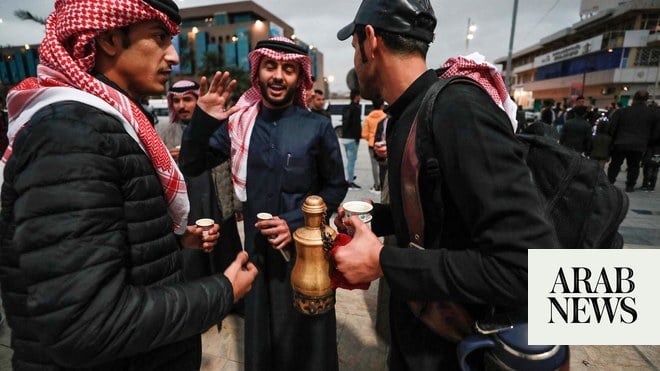
Lack of accommodation at the 25th Arabian Gulf Cup has led locals to house and feed visiting supporters for no charge
BASRA: Ever since Basra was announced as the host of the 2023 Arabian Gulf Cup, concerns over adequate accommodation were raised. With thousands of footballing fans descending on the southern Iraqi city, a limited number of hotel rooms has left many expecting a lodging crisis.
For the latest updates, follow us on Twitter @ArabNewsSport
Basra’s abundant hospitality, however, has meant that no visitor to the city has been left without a place to stay as the local community opened its doors to guests.
For decades, Basra has not been the tourist destination it once was. Gone is the old Sheraton Hotel along the corniche, now under the less prestigious brand of Basra Millennium Hotel. Since that golden era of Basra tourism, few hotels have been added to the city’s roster. Tripadvisor only lists 13 hotels in the city, with other smaller hotels dotted around the city, most of which have been used by those in the oil industry and not tourists.
These limited rooms were immediately booked after the announcement of Basra as the host city of the 25th rendition of the tournament. If not housing each country’s team members, the rooms were reserved by media personnel, political delegates and celebrities. Few rooms were left for the general public, so the people of Basra stepped up and bridged the gap.
“We can’t have guests come to our city and stay in hotels,” said Sajjad, a 42-year-old electrical engineer in Basra. “It’s an insult,” he continued, showing visible discontent at the idea of anyone paying to stay in a hotel after putting up five tourists from Baghdad in his home, only one of whom he knew previously.
“They should never consider themselves guests,” said Sajjad of his temporary housemates. “It is their actual home.”
Mustafa, one of Sajjad’s guests, expanded on this hospitality. “It’s a service I’ve not seen elsewhere, not even in hotels,” he said. “Sajjad went out and came back with bags full of items like toothbrushes on the off chance we had forgotten things.”
These examples have been repeated throughout Basra. Even I have been given the keys to an apartment by someone I do not personally know to house me for my entire stay. And just like with Mustafa’s experience in Sajjad’s house, I found a fully stocked fridge should I need anything during my stay.
The community’s hospitality goes beyond lodging. Asking for directions to a restaurant ends with an invitation to dinner with a family. Going out, guests of Basra have rarely had to pay for meals as the city’s residents refuse to let them part ways with their money. Ordering lablaby, an Iraqi winter specialty made with chickpeas and usually sold by street vendors, the store owner on the corniche refused to take money from me or any of my friends as soon as he knew we were from out of town.
On one occasion, a taxi driver, Haider, refused to let me ride with him until he had bought me a cup of tea first.
“I consider myself a king these days,” Haider said with a glowing smile. “When I see the guests of Basra from all over the world so happy to be here, I feel fantastic!”
It is this selflessness that explains how the people of Basra take pride in opening the doors to their homes. One tribal leader, Sheikh Kadhim Al-Sarayfi, has opened his guest house to a multitude of tourists each day of the tournament.
This is all despite the fact that Basra has suffered from years of poor public funding from the central government of Iraq, which has caused basic infrastructure in the city to fail.
Basra suffers from a lack of clean water access, poor healthcare facilities and a housing crisis that has led to the creation of 677 informal housing units in the city. With these ongoing issues, locals have still been excited to welcome in as many people as they can.
The hospitality even explains Basra’s desire to continue distributing its wealth to the rest of the country. As the wealthiest city in Iraq, contributing to 70 percent of the nation’s gross domestic product but receiving a disproportionate return, a movement to secede from the central government began.
But it was Basra’s concern over the rest of Iraq that stopped the plan. “What about the poor people of Samawa and Hilla?” asked Haider. “We did not want them to suffer and are proud to share our oil.”
Often, stories are told about the hospitality of host countries to their guests, and I have indeed been to various sporting events around the world. The generosity of the people of Basra has definitely stood out. It really has been a privilege to witness. It does not matter that no hotel rooms are available; not only will the locals give you a home, they will make sure you are extremely well fed too.












